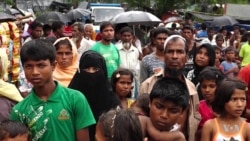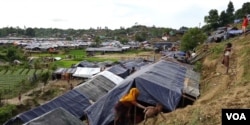Overwhelmed and underfunded, aid agencies in Bangladesh are at a breaking point. But nearly three weeks into Rakhine State’s bloody conflict and the humanitarian crisis shows no signs of relenting.
Around 400,000 Rohingya Muslims have now sought refuge in the country's southern state of Chitagong, with the UN’s top human rights official saying Myanmar is carrying out 'a textbook example of ethnic cleansing' against the Rohingya.
With refugee camps at full capacity and insufficient support from aid agencies, Bangladesh makes for an inhospitable home.
“Too many Rohingya have arrived, so there is not enough room of us in the camps," said Noor Mohammed, a Rohingya refugee. "We do not know where else to go so we are sleeping on the side of the road. It is very miserable.”
New arrivals are clearing hectares of forest to make space for the spontaneous settlements that are springing up across the country’s southern border.
Rumors of a new camp quickly spreads among the roadside population, sparking a desperate scramble for the limited space.
With little or no access to basic humanitarian services, conditions in these makeshift camps are dire, with some unable to access the life saving assistance required after days walking through the Myanmar jungle.
“I have been in the camp for three days with my five children, the youngest one is very ill and suffering from malnutrition," said Ansar Begum, while holding her baby in her arms. "I am worried that my child will die if I stay in the camp because we are not getting any support or medical aid.”
Save for a few tarpaulin sheets, an official humanitarian response is difficult to find among the new Rohingya settlements.With a shortfall of $77 million, the United Nations admits it is unprepared to meet the demands of the growing refugee population.
A water delivery draws a large crowd. Despite lining up for hours, some of the men in line will go home empty handed.
“We are struggling," said Azmat Ulla of the International Federation of Red Cross and Red Crescent. "I believe like many other agencies here, we are struggling for resources. We need resources fast.”
While the aid organizations wait for their funding to trickle in, it has fallen on the people of Bangladesh to meet the needs of the desperate Rohingya population. Every day, hundreds of citizens rally together to distribute food, water and clothing bought from the local market.
But their generosity will not sustain a refugee population that is growing day by day. Unless the official response is scaled up soon, this humanitarian crisis might turn into another humanitarian disaster.







